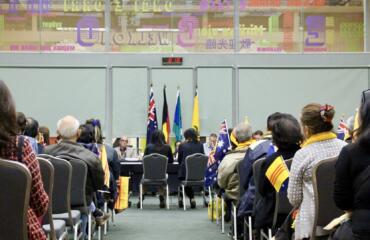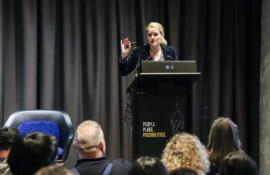‘My project is about international students in Australia. More specifically, the Chinese students in Foundation Studies programs, which are pathway courses for overseas students before they get entry into Australian universities.
My interests on international students first began during my work with Trinity College. Originally, I thought of teaching as a means to an end.

I was a lecturer in psychology and had previously worked closely with international students.
But eventually, over a period of time, it became obvious that there were important issues relating to how international students are treated and looked after, not just in Australia but internationally as well.
Additionally, as education is Australia’s third biggest export, I think it is important for us to look after the people who are contributing so greatly to our economy.
We often assume that international students are all just one type, that they all come from the same country, perhaps mainland China, they all have the same educational background, they all have the same family without sisters or brothers, they all come from the same cultural heritage. In reality, that’s not true at all.
They may differ on a range of measures. You have students who are very high-performing, those who are poor-performing, those who are unsociable, those who are extremely sociable, those who have a clear plan for the future and those who don’t know what to do after uni. They are just so different.
I used a combination of two research methods in this project. One is survey, and the other is interview. At the beginning of their foundation studies, I recruited participants from among the new students.
I sent out about 400 questionnaires to get a basic understanding of what these students expected from the program. One year later, when they were leaving for university, I randomly chose 23 Chinese respondents of the survey, and did an in-depth interview with them.
We often assume that international students are all just one type, that they all come from the same country, perhaps mainland China, they all have the same educational background, they all have the same family without sisters or brothers, they all come from the same cultural heritage. In reality, that’s not true at all.
That way, I was able to find out what impact the foundation study program had on them.
The finding, in a nutshell, is that we have missed the social dimension in international student support.
The interview tells us that at the beginning, practically all Chinese students saw their foundation studies as a stepping stone for getting into university. They had an instrumental view of this pathway program.
But when they were leaving the program, they started emphasising the social relationships they had developed during the year, and said that they were an important part of their experience.
I think that the foundation study program investigated did too good a job in supporting international students. Once the students had finished their foundation study and entered university, they found themselves left alone once again.
The teachers in the foundation programs are doing a great job in cushioning the students’ entry to a new country, but they should also build up the students’ social capability, so that they can experience a smoother transition when entering university.
Foundation studies programs may be good in preparing them academically, but not in helping them live and feel welcomed within higher education environments.
Perhaps one way forward is to emphasise less the commercialisation of higher education. That’s not something that we want to be known or characterised by.
The teachers in the foundation programs are doing a great job in cushioning the students’ entry to a new country, but they should also build up the students’ social capability, so that they can experience a smoother transition when entering university.
What we need to do is pay more attention to the social wellbeing and welfare of the students. I think my study can be a valuable input in this regard.
The universities should make some efforts, as well. It is not enough to simply have an international student club. Because, when you put all the international students in a club, you are actually marginalising them.
What we need is some top-down measures from the university. For example, the faculty members should do more to introduce better collaborative work across different groups and interactions among students.
More personally, I believe students themselves can do more, both Australian students and internationals.
In the globalisation context, it is crucial for the host students to realise the value of international students and their inputs for the sake of both the education quality of the international students and that of their own.
And to the internationals, and specifically my interviewees, my message is that you should put yourselves out there more.’
► Ian Teo’s thesis is titled: ‘Transitioning from a Chinese education to an Australia education: a study of foundation studies program students from China.’
* My PhD is an irregular series in which The Citizen speaks with recent Melbourne University PhD graduates.

